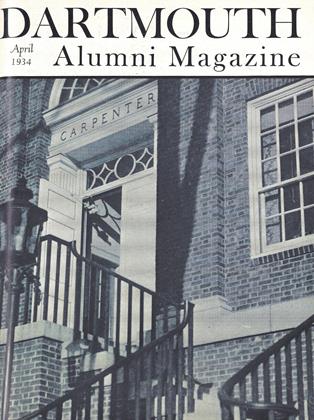One of the unrecognized, highly individualized majors in Dartmouth College is that of a major in criminology. It has been the writer's attempt in the past two years to fit himself as far as is possible for a career in criminology and penology. His interest in this field of work has always been latent; it remained to be brought to the surface by an elementary sociology course and through more advanced courses of the sociology department.
In reality the major is a combined sociology-psychology major, something which as yet has not been definitely organized at Dartmouth. Courses taken in the psychology, abnormal psychology, social psychology, personality, and measurement in psychology. A course in educational tests and measurements was taken for the technique in administering tests, and Professor Larmon's course in administration for a broad survey of administrative methods and problems. Finally the courses in the sociology department consisted of community organization, race problems and immigration, criminology, social maladjustment, and a thesis course in which an original thesis was submitted to the sociology department embodying the knowledge gained from the above-mentioned courses, the thesis in this case being a study of newspaper editorials and their relation to crime and public opinion. In short, the major is a study of human behavior in all its forms, from the aspect of the group and its culture (sociology), and the aspect of the individual (psychology).
At a conference of professors and students from New England Colleges, held at Norfolk (Mass.) Prison called together by Superintendent Howard B. Gill several years ago, it was voted to collect data from colleges on courses valuable as a preparation for the career of penal administrator. As a result of the report from Dartmouth the writer has followed to a great degree the courses as outlined in the report from this college.
It was necessary to overcome some difficulties to take these courses because of departmental requirements for the major. The sociology department, however, excused the writer from some of the requirements that he might be able to specialize more fully in the field of his interest, and for this permission he is greatly indebted to both the sociology department and the College for allowing such curricular adjustments to be made.
The courses taken have existed for many years but it is the synthesis which is new and to which attention is called. To make available to the student something like this within a liberal arts college is indeed something which reflects credit on the flexibility of Dartmouth's curricular organization to permit this advantage to her students. It is my belief that a major such as this is not available in any other college short of actual graduate study. And yet at the same time the college is keeping within its objective, that of educating men for usefulness. Should a man come up here and take the courses which I have taken, at the end of four years he would not find that he would be fully equipped to be a criminologist or a penologist, but rather that he had prepared himself in a broad sense for that profession and at the same time had received a liberal arts education; the courses taken allow for that and the primary objective of the College is never lost in this rather specialized major.
The "New Penology" has recognized the value of college-trained men in its field, and positions are being created especially for college men. For instance, Sanford Bates since his appointment as director of federal prisons has created the civil service position of social case-worker and at the present time has twenty-two college men in various federal prisons throughout the country. Howard B. Gill, superintendent of Norfolk Prison, the foremost prison in the country, penologically speaking, is doing his best to get college men into the field. It seems, therefore, to the writer that penal administration is a promising coming profession. Should not the liberal arts college increasingly make such adjustments in individual cases as to enable her students to fit themselves to a limited> degree for that and similar professions while at the same time keeping within the bounds of a liberal arts college, namely, that of educating men for usefulness?
Westward on Tuck Mall With Russell Sage Hall on the Right and Tuck School in the Distance.
 View Full Issue
View Full Issue
More From This Issue
-
 Class Notes
Class NotesClass of 1918
April 1934 By Allan C. Gottschaldt -
 Article
ArticleHANOVER BROWSING
April 1934 By Rees H. Bowen -
 Class Notes
Class NotesClass of 1910
April 1934 By Harold P. Hinman -
 Class Notes
Class NotesClass of 1908
April 1934 By Laurence W. Griswold -
 Class Notes
Class NotesClass of 1930
April 1934 By Albert I. Dickerson -
 Class Notes
Class NotesClass of 1923
April 1934 By John C. Allen







